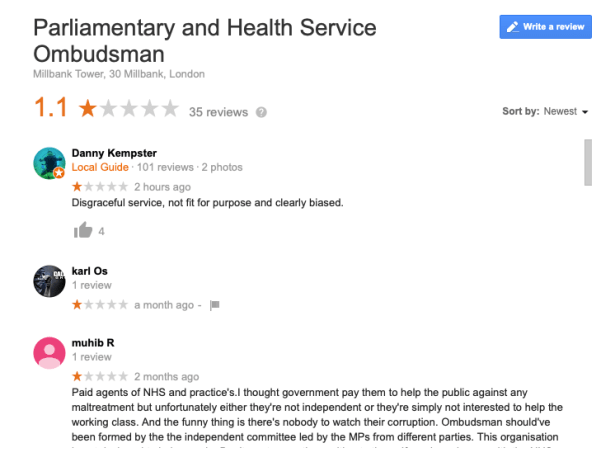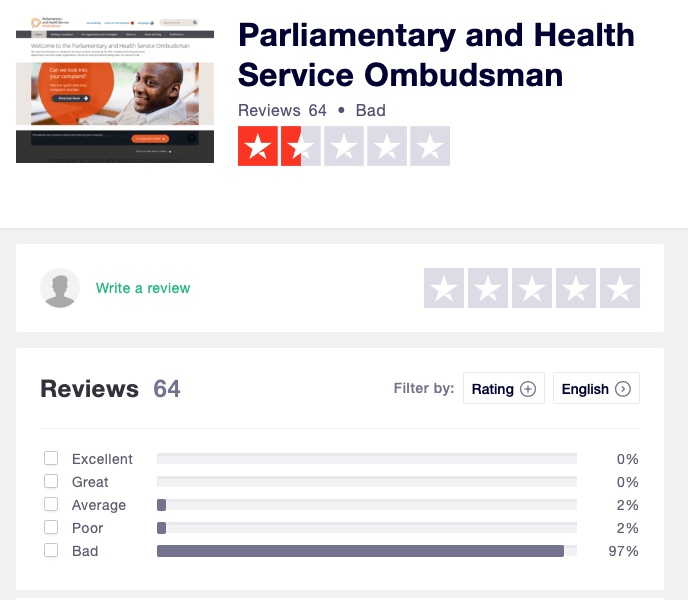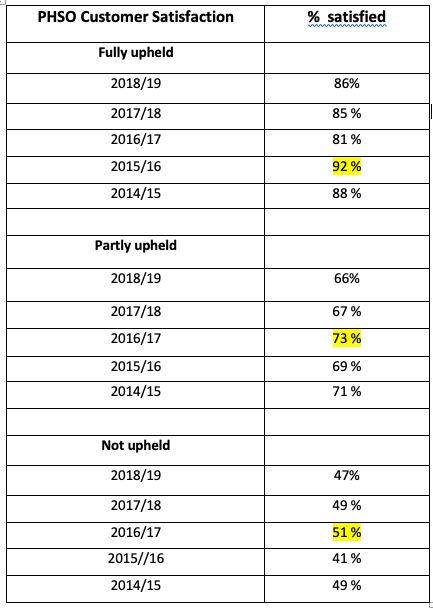When Rob Behrens took over as Ombudsman in April 2017 he knew it would take time to restore public confidence in the organisation. Dame Julie Mellor, the previous Ombudsman, resigned in July 2016 under a cloud of collusion but stayed in office until Mr Behrens took over.
In the 2018 Peer Review Peter Tyndall and team described this time as:
In recent years, the Parliamentary and Health Service Ombudsman (PHSO) has faced organisational crisis. Issues affecting its previous leadership also resulted in a loss of trust in the PHSO. To use a medical metaphor familiar from the Ombudsman’s casework, this report concludes that, under its current leadership, the organisation is moving out of ‘critical care’ and into ‘recovery’.
It would appear that Dame Julie Mellor had brought the organisation to its knees but fortunately Rob Behrens was a man with a plan .
The new corporate plan introduces a streamlined operating model and improved corporate training for staff to both quicken the average 234 days it takes to adjudicate a complaint and deal with a 24% funding cut. The strategy will be implemented from next April [2018] after the PHSO moves its main office to Manchester this month … The plan will also help the watchdog recover from what Behrens called a “loss of confidence” following the controversial resignation of his predecessor.
Nearly 18 months later, let us see how the ‘streamlined operating model’ and ‘improved corporate training’ is working to restore public confidence. We can start by looking at the figures collected by PHSO customer feedback. PHSO send customer details to a third party who collect this data on their behalf. There is no open access to this survey for all service users. Amazingly, during the time of ‘organisational crisis’ PHSO achieved some of its highest satisfaction ratings. The 2018/19 scores give an indication of whether the new corporate plan is having an effect and apart from those with a full uphold (what’s not to like about a full uphold?)the scores are in decline and still a significant way from the highest confidence scores achieved during the ‘crisis’ years.
In this digital age there are other available routes to sharing your views on an organisation such as ‘Google reviews’. Recent reviews on the ‘Millbank Tower, London’ site fall into a similar, negative vein. While those on the Manchester site are more mixed in their opinion
Then there is Trust Pilot where the most recent reviews continue to give damning accounts of negative experiences at PHSO.
From the evidence above, you and I might consider that the plan is yet to deliver but no
doubt there will be much back slapping and mutual appreciation displayed at the Annual Open Meeting
soon to be held in Manchester.
So how about you – are you feeling confident about PHSO yet?






I certainly wouldn’t feel confident if I had a parliamentary complaint. This recent FOI response reveals some troubling information:
“1. There were 5,744 Parliamentary complaints received in 2018/19
2 There were 38 Parliamentary cases upheld or partly upheld at investigation in 2018/19 (3 upheld, 35 partly upheld)
3. There were 52 Parliamentary cases not upheld at investigation in 2018/19.”
https://www.whatdotheyknow.com/request/complaints_against_government_de_2#comment-91018
3 fully upheld out of 5, 744 – that close to 1 in 2,000!
Things would probably look better, however, if the figure of referrals from MPs was used instead of the complaints figure of 5,744. In 2018/19 there were 2,428 referrals from MPs:
https://www.whatdotheyknow.com/request/mp_referral_for_the_year_201819
A lot of parliamentary complaints don’t appear to make it past the MP filter.
LikeLike
If most complaints don’t get past the MP referral then where does the 5,744 figure come from?
LikeLike
I’ve left a couple of reviews on Trust Pilot regarding the corrupt PHSO. Quite simply they are useless with complaints but brilliant at bringing complainants to breaking point. PACAC, who scrutinise this government quango, are no better. They are all only there to make it look as though the government are being diligent. Well they aren’t. It’s one great big sham that the taxpayer pays for, what a waste of public funds.
LikeLike
Very important that people use every avenue to tell the truth about PHSO masquerading as an effect organisation. I fail to understand how our MP’s sleep at night knowing their lack of pressure on government allows so much distress to the public they ‘serve’. Being non-political, new people are needed at PACAC to properly scrutinise PHSO and that must start with it’s chairman. I hope for a change of faces there after the election
LikeLike
I agree. PACAC is at the heart of the problem, and need to start addressing the concerns of the public. If the PHSO are not properly scrutinised then there is no incentive for them to behave effectively and every incentive for them not to do so. By also failing to address the public’s concerns the Patients Association are equally culpable.
LikeLike
Absolutely no confidence. The PHSO is about as bad as DWP and that is going something. Deadlines to the PHSO are an abstract concept but they hold a complainant to deadlines. Case work isn’t organised such that they had two weeks to work on my comments following an error strewn provisional report but the case worker is working on it last minute and then doesn’t meet the deadline given to me of 30/9/19. This suggests a shambolic approach to cases. Yes I sent them a lot of comments because the provisional report was that bad. Nearly 2 years later and the final report is being pushed back day by day. None of my evidence used in the provisional report but whatever a Trust says is taken as fact without being challenged by PSHO and without evidence to back it up.
The PSHO is supposed to hold the NHS to high standards but it doesn’t. All it does do is allow systems to continue that are harming or even killing people and they aren’t interested. PHSO is just another show pony in the ring strutting it’s stuff without any substance.
LikeLike
Serious problem protecting NHS. Completely disregarded National Framework in contradiction to what they said. Made application for Judicial review but again protected by court.
LikeLike
Thanks for your feedback
LikeLike
The answer is NO. Left my twinkle twinkle minus star some time ago, no change yet. PHSO is purely to keep cover ups covered up.
LikeLike
As I had my complained rejected and I gave up as I was not getting anywhere can they relook at my complaint again seeing the problems there have been with the Phso. Regards Phil Bonnett
LikeLike
Reblogged this on | truthaholics.
LikeLike
As we know, PHSO have used the excuse that these reviews are unfiltered as if to imply people can just leave bad reviews and it’s unbalanced. But as one (very rare) user left a 5 star review a few months ago, we know that’s not true. Not many people leave reviews for PHSO, but of those that do, the majority are very bad. Social media is choc-full of stories of PHSO dishonesty and lack of justice. As we also know, what this serves to do, is to condone public body (often NHS) failings and corruption and nothing therefore changes. The NHS have a history of urging people to take their complaint to PHSO because they know there is a tiny chance it will be upheld. I think the statistics are less than 3%. And there are thousands never investigated at all. And there is nothing the public can do about either of these appalling facts, because PACAC are a show pony as has been clearly demonstrated by their so-called scrutiny panels. The don’t challenge PHSO whatsoever and the many (increasing) public submissions show a corrupt and failing service, which amounts to fraudulent misuse of public money. Behrens is nothing new, he’s another show pony.
LikeLike
Left a bad review on trust pilot !!!! Thank you
Hope all’s well with you Della
LikeLike
I’m off to the Manchester meeting James. Did you ever get any resolution to your case?
LikeLike